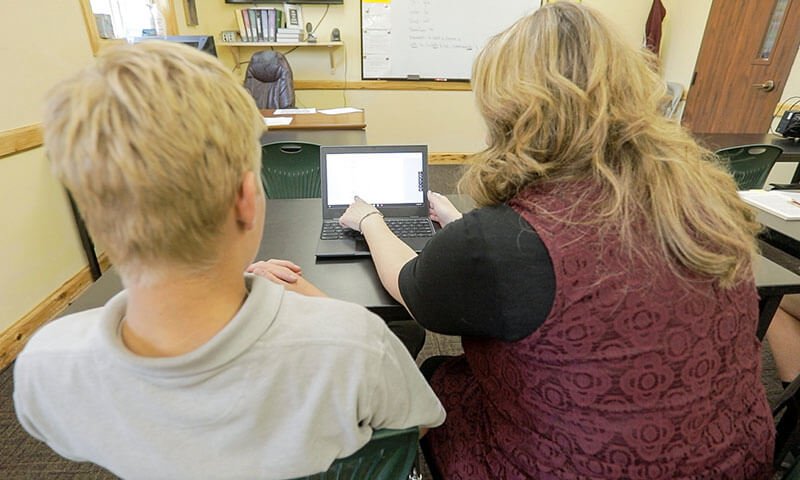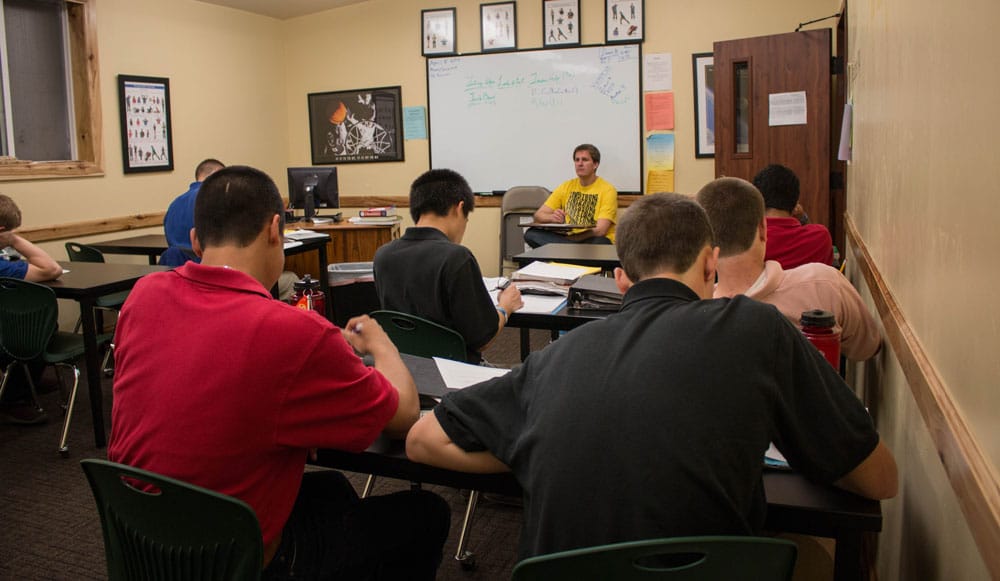
(click below to go to a section on this page)
It's concerning when your teenage son adamantly refuses to attend school. As a parent, you may have questions about what is causing this resistance. Parents often struggle with how to support their teens experiencing school anxiety. Seek guidance from experienced professionals who understand this challenging situation. Their expertise will be instrumental in helping you navigate and support your child.

What Is School Refusal?
School refusal is characterized by a student's reluctance or refusal to attend school due to emotional distress or anxiety. This refusal often causes significant social, academic, and familial disruption. It may involve tardiness, difficulties remaining in school for the entire day, or complete absences from school, resulting in an ongoing problem that can lead to serious short- and long-term negative impacts.
This issue is often associated with anxiety or depressive disorders and can lead to severe academic, social, or psychological issues if not properly addressed.

The Impact of School Refusal On Teens and Families
When a teenager begins refusing school, the consequences of such a decision can dramatically affect not only the adolescent but their entire family as well. There are numerous broad-ranging effects associated with school refusal:

- Academic Effects - From an educational standpoint, repeated absences from school can cause substantial gaps in the child's learning. This can eventually result in poor academic performance and escalate the likelihood of the student dropping out.
- Social Effects - Socially, irregular school attendance can foster social isolation. This absence may hurt the child's social skills, as well as existing and potential friendships and other relationships.
- Effects on Mental Health - psychological factors contribute to a teenager's school avoidance. The behavior can be indicative of underlying mental health issues like anxiety or depression. If these issues are not correctly addressed and managed, the refusal to attend school could exacerbate these conditions over time.
- Effects on the Family - On the home front, parents must cope with the disruptions that come when their child is frequently refusing school. Their regular routines can be affected significantly, which can impact their professional lives. Emotionally, parents may experience distress because they may feel incapable or inadequate in addressing the problem. This issue can potentially cause disagreements and strain within the family.
- Financial Effects - Finally, the economic consequences are considerable. Parents may need to take time off work to manage the situation, leading to potential income loss. If the problem persists, it could put significant economic pressure on the family, potentially leading to significant financial strain.
Identifying The Signs of School Refusal
Given the substantial consequences associated with school refusal and avoidance, it's essential to recognize and address the signs early on.
Emotional Signs
School refusal is usually connected with emotions like sadness, fear, anxiety, anger, depression, or defiance when the teenager is anticipating going to school, or an elevated mood when allowed to stay home from school. Teens may often show distress and emotional outbursts at school times or may exhibit clingy behaviors.
Cognitive Signs
Students who experience school avoidance might constantly think and worry about school-related issues, even when they're at home. This can manifest in frequent complaints of boredom or disinterest in school activities.
Physical Signs
Anxiety associated with school refusal often manifests as physical symptoms like headaches, stomachaches, nausea, and vomiting. Teens may also frequently visit the school nurse with various complaints that do not have an identifiable physical cause.
Behavioral Signs
Common behavioral signs include persistent tardiness or absences, repeated attempts to leave school during the day, and prolonged morning routines or bedtime rituals designed to delay the school day.
Progression of School Refusal
Initial Refusal
Teens start by resisting or showing reluctance to go to school. This might be due to various reasons such as separation anxiety, academic issues, social fears, or other stressors at school. It may also be because teens may have increased access to preferred activities and attention from parents when they stay home from school. Parents might dismiss these initial signs, attributing them to laziness or lack of motivation.
Increasing Anxiety
As the anxiety continues, teens may express negative emotions or exhibit somatic complaints (physical ailments that lack a medical explanation), especially on school days. There might be episodes of tantrums, clinginess, or defiance when it's time to go to school.
Chronic Absenteeism
If the school refusal behavior is not appropriately addressed, teens may start missing school for extended periods. The absence can lead to academic, social, and personal setbacks.
Development of Associated Problems
If untreated, school refusal can result in more significant problems including academic failure, school drop-out, family conflict, isolation from peers, underachievement, and long-term psychiatric difficulties.
Potential Causes of School Refusal
There may be a variety of reasons why a teenager might refuse to attend school. These may include:
- Anxiety Disorders: A teenager may refuse to go to school because they struggle with generalized anxiety disorder, social anxiety disorder, panic disorder, or challenges associated with obsessive-compulsive disorder.
- Bullying or Peer Pressure: A teen may refuse to attend school because of fear of confrontations or negative interactions with other students.
- Fear of Failure: Teens with high expectations for themselves, or from their parents, may refuse school if they believe they cannot achieve their desired grades.
- Separation Anxiety: Some adolescents become extremely anxious at the thought of being separated from their parents and hence refuse to attend school.
- Academic Struggles: Teens with learning disabilities or difficulties keeping up with their studies might feel overwhelmed and anxious about going to school.
- Problems at Home: Family issues, such as financial problems, parental separation, domestic violence or substance abuse, can make a child feel unsafe or emotionally distressed, making them not want to leave their home.
- Transition Challenges: Changing schools, transitioning between elementary to middle or high school, or a sudden change in routine, can cause stress or fear in a teenager, resulting in school refusal.
- Traumatic Events: If a teen has experienced a traumatic event, such as a violent incident at school or the loss of a loved one, they may feel anxious about returning to school.
- Social Isolation: If a child feels left out, rejected, or lonely at school, they may be reluctant to go.
- Lack of interest: If school is not engaging or fulfilling, teens may lose interest and refuse to go.
- Medical Conditions or Mental Health Issues: Conditions like chronic illnesses, depression or obsessive-compulsive disorder can also lead to school refusal.
- Learning Differences: Learning differences and disabilities can play a significant role in school avoidance. Teens who have difficulties in learning, such as dyslexia or ADHD, often experience high levels of frustration, stress, and anxiety because they struggle to understand and remember information as easily as their peers. These feelings can lead to negative associations with the school environment. Moreover, if these students feel misunderstood or singled out because of their learning challenges, it can intensify their social anxiety.
Remember that these are potential causes and each teen's experience can be unique. It's important to communicate with the teen and seek professional help if needed to identify and address the root cause of the issue.
The Challenges With School Refusal and Getting Support
Tackling school refusal is a complex process with numerous challenges that hinder a teen's educational progress and overall development. Overcoming these hurdles requires the expertise of psychologists, adolescent therapists, and school counselors who work together to create a customized plan designed to successfully reintegrate the teen back into the school setting.
The Importance of Understanding Underlying Issues Driving School Refusal
As a parent, understanding the underlying issues related to school refusal cannot be overstated. It lies at the heart of offering better support to students and developing an inclusive, engaging school environment that addresses all teen's needs, no matter the issues they face.
Early identification and diagnosis of these issues can help professionals design effective interventions. It enables school officials, parents, and peers to provide the necessary support and care to students. It can also help improve the learning environment and the student's academic performance by reducing stigma and improving the mental health of students.
Tailoring individualized treatment plans rather than generalized therapy will provide more effective help to the students. This early identification and treatment could prevent potential long-term academic, social, and mental health problems, thereby underlining the crucial need for understanding and addressing these issues at the earliest.

Seeking Accommodations and Support with School Refusal
Recognizing the need for accommodations and support for students with school avoidance is crucial to assist them in overcoming this issue. It's also vital to foster an understanding and supportive environment, allowing these students to navigate their fears and concerns effectively.
Parents and school staff must work together to help the teenager overcome school anxiety. The collaboration should focus on supporting the teen emotionally and academically while gradually working to get them back into regular attendance. School staff should be trained to recognize signs of school anxiety and be provided with resources and tools to support the students affected. They should be trained to use a compassionate and empathetic approach when dealing with such students.
Creating a support network of peers can also help. This could include buddies, mentors, or simply a supportive and understanding group of friends.
Remember, students with school refusal aren't merely skipping school out of defiance. They're dealing with severe emotional distress and fear that can lead to numerous mental and physical health problems. Recognizing the need for accommodations and providing the right kind of support can go a long way in helping them cope with their fears and anxieties.

Understanding 504 and IEP Plans
Section 504 of the Rehabilitation Act of 1973 is a civil rights law aimed at preventing discrimination against individuals with disabilities. The Rehabilitation Act defines a teen with a disability as "A person who has a physical or mental impairment that substantially limits one or more major life activities, a person who has a history or record of such an impairment, or a person who is perceived by others as having such an impairment." Emotional disturbance, which is one of the thirteen specific disabilities identified in the Individuals with Disabilities Education Act (IDEA), encompasses a range of mental health issues that can cause school avoidance, including anxiety.

If your teen is struggling with school avoidance or school refusal due to anxiety their school may give them either a Section 504 Plan or an Individualized Education Program (IEP). These are two separate educational frameworks designed to protect the rights of students with disabilities.
504 Plans
A 504 Plan is formulated for students who possess a disability, yet do not necessitate special education services. A 504 Plan is a tailored program for students with school anxiety who may need flexible scheduling, modified homework, personalized instruction methods, and emotional and academic support so they can learn alongside their peers. It provides an organized, written document and structured plan to help students meet their needs and achieve their educational goals.
Individualized Education Plan (IEP)
An IEP provides schools and teachers with specialized instruction and supports so students can access and progress in the curriculum. A personalized IEP plan is designed to offer specialized education and additional services that cater to the specific requirements of students who face challenges due to physical, mental, or learning disabilities. These impairments significantly limit their ability to engage in important life activities. As a result, these students are entitled to receive modifications, accommodations, or support that will help them fully participate in and derive benefits from public education programs.
Determining whether a student is eligible for services under a Section 504 Plan or an Individualized Education Program (IEP) can sometimes be confusing, even for experienced educators. Both IEPs and 504 plans aim to provide formal assistance to K-12 students who are facing challenges in school. While there are similarities between the two, they also have significant differences. The main purpose of an IEP is to uphold the child's rights as per IDEA, while also addressing their needs through a personalized support system. IEPs are updated annually and involve specialized instructional goals and objectives. On the other hand, 504 plans offer accommodations without requiring specialized instruction and do not need to be updated every year. Both plans offer advantages in helping students progress towards independence.
If your teenager is experiencing school-related anxiety or refusal, it is important to seek help from the counseling center at their school for guidance on creating a personalized education plan. They should be able to help you know whether you need an IEP or a 504 Plan.
However, some school districts may struggle to meet the demand for accommodations or lack the resources to support students with emotional challenges. If this is the case, you can turn to an Educational Advocate or Lawyer who can assist you in determining the most suitable education plan for your teen and work with both you and the school district to ensure their needs are met.
Seeking Professional Help For School Refusal
Seeking mental health professional assistance and opting for residential treatment stands as a crucial stride in addressing school refusal. It furnishes a secure and organized setting wherein the child comprehends and learns to navigate their fears or anxiety. This approach aids in surmounting their reluctance to attend school, fostering growth and progress.
Continuum of Treatment Options for School Refusal
While every student is different, the stages that lead up to a residential treatment program often go as follows:
- Early Intervention: This involves identifying signs of school refusal like frequent sickness, missing school frequently, fear of being alone at school, and social withdrawal. This is the first step before residential treatment, which includes identifying the problem early enough.
- Outpatient Therapies: It is important to involve the child in cognitive-behavioral therapies and counseling. This step helps to manage the problem and find out if the child is suffering from any psychological disorders such as anxiety, depression, etc.
- Medication: Depending on the situation, medical professionals might prescribe medication to help manage underlying disorders.
- Day Treatment Programs: If outpatient treatments are ineffective, the child might benefit from therapeutic day programs. Here they would continue their education while receiving additional mental health support.
- Residential Treatment: If none of the above interventions work and the child's symptoms continue to worsen, then the final step might be residential treatment. In these facilities, professionals provide intensive support for children suffering from school refusal and other emotional and psychological disorders.
An Overview of Residential Treatment
In residential treatment, the child resides in a mental health treatment center. These centers typically have a home-like setting, are staffed with therapists and mental health professionals, and integrate therapeutic schooling into the residential program.
During their stay in residential treatment, they continue their education and partake in therapies tailored to their unique needs. It's the environment in which a child can get round-the-clock supervision and care. Transition back to school happens gradually and with professional support, to ensure success and the prevention of relapse.

Teaching executive functioning skills plays a significant role in managing these challenges. Skills like time management, planning, organization, and self-control can significantly boost a teen's self-confidence and ability to navigate academic pressures. By incorporating these cognitive and behavioral strategies into their lives, teens in residential treatment can learn to manage school anxiety and avoidance more effectively, leading to improved school attendance and performance.
While a last resort, residential treatment for school refusal has been successful for many families struggling with this challenging problem. If you think your teen may need treatment for school refusal, please call and talk with our admissions team. They can help determine if residential treatment is the right choice for your family. You can also work with an educational consultant. They have in-depth, first-hand knowledge of therapeutic schools and programs and can help you find the program best suited for helping your teen overcome the issues causing their school refusal.
Developing Executive Functioning Skills
Executive Functioning Skills refer to brain-based life skills that help individuals perform tasks, manage time, pay attention, switch focus, plan and organize, remember details, curb impulsivity, and integrate past experience with present action. School refusal can often stem from struggles in these areas. Here are ways a residential program helps students develop these skills:

Time Management
Students learn how to break down tasks into manageable steps, estimate the time needed for each step, and plan their time accordingly.
Task Initiation
Students are encouraged to take initiative in their schoolwork by giving them responsibility for certain tasks. They can start by picking the task they would like to begin with and working through the task in stages. This might involve brainstorming ideas, gathering materials, and completing the work in a structured way.
Goal-Directed Persistence
Students set realistic goals and then break those goals down into smaller, manageable steps. They track their progress and adjust their approach if necessary.
Parents and teachers can assist students by creating structured, predictable routines, modeling and practicing these skills themselves, and providing lots of opportunities for students to practice these skills in safe environments. These skills not only support school attendance but will serve children throughout their lives.

